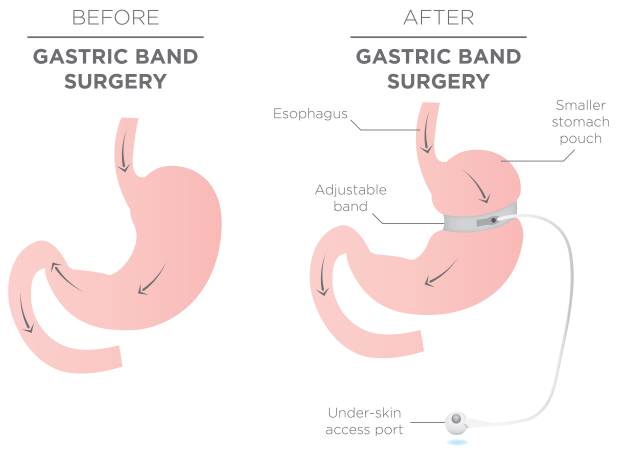Treatments – Bariatric Surgery
Laparoscopic Gastric band
This procedure is performed under general anaesthesia. It is usually performed in patients with a BMI greater than 30. The procedure involves the insertion of an adjustable fluid inflatable band around the upper part of the stomach to form a small pouch. This restricts the amount of food you can eat before you feel full, meaning that you can only eat a smaller amount of food, you need to chew your food well before swallowing and eat smaller portions slowly.

The operation takes place through small incisions, 0.5-1cm typical size, through which gas is inflated in order to create space and make internal organs easy to see. A long thin tube with a tiny camera at the tip (laparoscope) is then inserted into the abdomen guiding the insertion of further long specialised laparoscopic instruments which are used to perform the procedure. The band is positioned around the stomach and a thin tube is attached to a small port under the skin which can later be used to inflate or deflate the band depending on how slow or fast you are loosing weight. The amount of weight you loose will also depend on the types of food you eat and the amount of exercise activity you undertake. The band can stay in your body permanently but can also be removed if needed.
Benefits of gastric band
This is a relatively safe procedure which is fully reversible. You should expect to loose approximately 50% of your excess body weight over the first 3 years following surgery provided you are committed to a healthy diet and good exercise.
Before the procedure
A low fat liquid diet is recommended prior to your surgery to shrink the liver In order to help with surgery. A change in lifestyle and increased exercise in preparation for life after the band are also expected.
Recovery
After the procedure you will be taken to the recovery room. Most patients need to spend a night in hospital but some may go home on the same day. You should be able to return back to normal activities and work after about 2 weeks. In the first 3-4 days after the band insertion you should only drink clear fluids, then you can start liquid diet for another 5 weeks at which point your band may need to be inflated. Following that you can start building up on soft diet and then normal food. You will only be able to eat small amounts of food, you will need to chew your food well before swallowing and eat smaller portions slowly. If you eat too much you may get a sensation of nausea and vomiting.
You will need to employ a new balanced healthier diet potentially with the help of a dietician, making the relevant lifestyle changes to reduce your calorie intake and increase your exercise. Be careful of not to eat small amounts of high calorie foods often as this will reduce your weight loss. Initial weight loss may be slow but you will be seen in clinic and have the band adjusted accordingly if that is the case.
Risks of the operation
The risk of complications includes those relevant to any laparoscopic procedure such as infection, bleeding, blood clots, heart problems, pneumonia, urinary retention, development of a hernia, damage to organs inside the abdomen and anaesthetic risks. Specific complication risks related to this procedure include the risk of the band slipping or eroding into the stomach (10%) needing for the band to be removed, the risk of severe gastro-oesophageal reflux (5%) needing for the band to be deflated or removed or having problems with the port or tubing of the band.
Choose Category
– Laparoscopic Gastric band
– Laparoscopic Gastric Sleeve
– Laparoscopic Gastric Bypass
Need to contact us or book an appointment?
Disclaimer
The information relating to general and colorectal disorders and their treatments given on this website is not complete and is not intended as a substitute for a consultation with your doctor. Always seek medical advice from your doctor before making a decision about any of the conditions and/or treatments mentioned on this website.
© Dr Georgios Markides
Contact Information
You can always contact our Clinic for booking appointments and other useful information:
Dr. Georgios Markides,
Consultant General & Colorectal Surgeon
Aretaeio Hospital, 55-57 Andreas Avraamides Str., 2024 Strovolos, Nicosia, Cyprus
+357-22-020728
Hospital: +357-22-200300
Fax: +357-22-512372
How to find us

